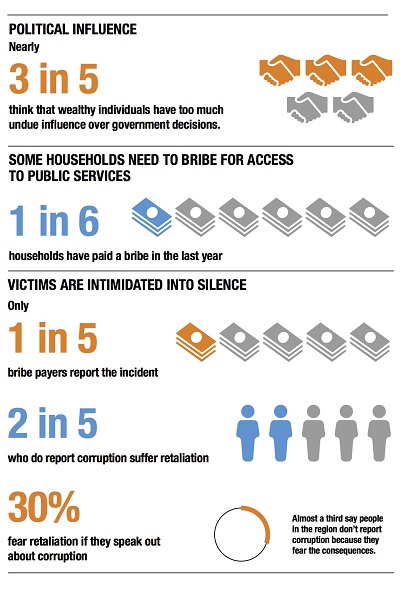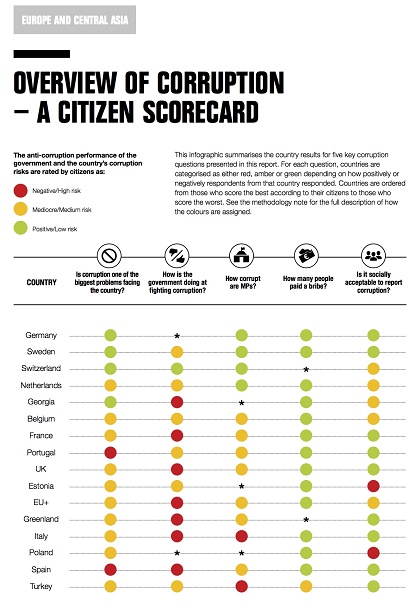One in three citizens think corruption is one of the biggest problems facing their country. Ukraine, Moldova, Bosnia and Herzegovina and Spain are the worst judged.

The surge of populist and nationalist movements in Europe is a reality in recent years.
“The reasons are diverse and complex, but corruption is central to this story, both the failure of governments to properly address corruption and their complicity in corrupt or clientelist schemes”, Transparency International believes.
The organisation has released its new report People and Corruption: Europe and Central Asia. For this new research, they spoke to nearly 60,000 citizens in 42 countries in Europe and Central Asia, via face to face and telephone surveys, about their daily life experiences with corruption.
 Source: Transparency International, 2016.
Source: Transparency International, 2016.“In EU countries many citizens see how the wealthy and those in government distort the system to their advantage”, said José Ugaz, Chair of Transparency International.
KEY FINDINGS FROM THE SURVEY
1. One in three citizens in the region think corruption is one of the biggest problems facing their country: This figure rises to two in three (from 65 to 67 per cent) in Moldova, Spain and Kosovo, showing that urgent actions against the abuse of power and secret deals are needed.
2. More than a half of citizens are highly dissatisfied with the way politicians are tackling the corruption risk in Europe and Central Asia: Over half (53%) said that their government is doing badly at fighting corruption, while less than a quarter (23%) say that they are doing well. The governments of Ukraine (86%), Moldova (84%), Bosnia and Herzegovina (82%), and Spain (80%) were judged worst by their citizens.
3. Politicians and public officials are seen as the most corrupt: Of the nine groups that we ask about, across the region, members of parliament and government officials are most likely to be seen as highly corrupt. Nearly a third of people say that most or all of them are corrupt (31% and 30%, respectively).
4. The private sector is not exempt: Over a quarter of citizens in Europe and Central Asia say that business executives are highly corrupt (26%).
5. Three in five citizens think that the wealthy have too much influence on public policy: They also believe that stricter rules are key to prevent this. Spanish and Portuguese citizens are the most likely to agree (88% and 85%).
6. Bribery is still common, particularly in the commonwealth of independent states (CIS): Although few households paid bribes when coming into contact with public services in EU, nearly a third of public service users in the CIS have paid a bribe in the past year and bribery is highest in Tajikistan where this rises to 50% of service users. Romania had the highest rate for an EU member state at 29%, followed by Lithuania with 24%.
7. “Standing up” and “speaking out” are seen as the best ways to fight corruption: Reporting corruption is seen as the most effective action to take against corruption in the EU (24%), followed by refusing to pay bribes. But 27% of citizens in Europe and Central Asia are resigned to the fact that people can do nothing.
8. Fear and lack of acceptance prevent people from reporting: Many citizens (30%) don’t come forward to report corruption because they are afraid of the consequences. Furthermore, less than a half of people think it is socially acceptable to report corruption in their country (38%).
9. Armenia, Bosnia & Herzegovina, Lithuania, Moldova, Russia, Serbia and Ukraine are seen as having the most severe corruption problems: These countries are rated poorly by their citizens across all of the key questions in the Global Corruption Barometer survey.
 Source: Transparency International, 2016.
Source: Transparency International, 2016.LOOKING FOR SOLUTIONS
“By their very positions at the top of the power pyramid, corrupt elites and oligarchs are hard to remove. But we have seen that it can be done if people stand together to demand higher standards from their leaders and the judiciary acts independently to hold them to account,” said Ugaz.
Transparency International gives some recommendations in its report to tackle and reduce corruption, based on the results of our survey and our experience in addressing corruption in Europe and Central Asia:
- Have transparent rules on lobbying and a public lobbying register, so that policy decisions can be better scrutinised.
- Ensure the independence of the judiciary, particularly in EU accession countries and the former Soviet Union, by reducing the influence of the executive over the judiciary and prosecutorial services and including transparent and objective systems for the appointment, transferral and dismissal of judges and prosecutors.
- Adopt and enforce comprehensive legislation to protect whistleblowers.
- Support whistleblowers and reporters of corruption and ensure appropriate follow-up to their disclosures.

Las opiniones vertidas por nuestros colaboradores se realizan a nivel personal, pudiendo coincidir o no con la postura de la dirección de Protestante Digital.
Si quieres comentar o